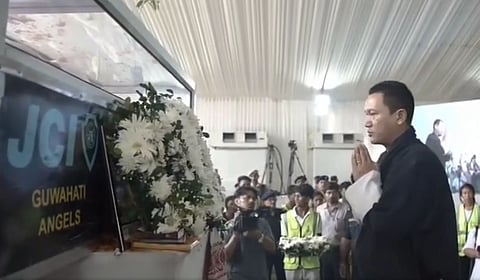
- Home
- Live Blog
- Breaking News
- Top Headlines
- Cities
- NE News
- Sentinel Media
- Sports
- Education
- Jobs

STAFF REPORTER
Guwahati: On the second day of mourning, the world once again witnessed an unparalleled outpouring of grief and love—something seen only once before after the passing of global pop icon Michael Jackson. Assam’s beloved son, Zubeen Garg, has left behind not just a legacy of music but the very heartbeat of a culture, a people, and a state.
From dawn till midnight, Arjun Bhogeswar Baruah Sports Complex and later Sarusajai Stadium became rivers of humanity, where men, women, and children lined up endlessly for one last glimpse of their “Zubeen da.” People sobbed quietly, some whispered prayers, while others softly sang his immortal songs, as though holding onto a piece of him for the final time.
Even when rain lashed down unexpectedly, the crowd did not move. With umbrellas or without, they stood firm—because love stood stronger than the storm.
Zubeen’s reach went far beyond Assam’s borders. In a moving gesture, His Majesty the King of Bhutan sent his representative to Guwahati to offer tribute. It was proof of how Zubeen’s melodies transcended boundaries, touching lives across nations and uniting hearts through the universal language of music.
Among the mourners were leaders, cultural icons, and colleagues from the film and music fraternity. AASU Chief Advisor Samujjal Kumar Bhattacharya and President Utpal Bora bowed their heads in grief. Noted actors Jatin Bora, Ravi Sharma, and Barnali Kalita, alongside singer Simanta Shekhar, joined the river of devotees who came to bid farewell.
But what defined these two historic days were not just the famous names. It was the ordinary people—the rickshaw puller who hummed Zubeen’s songs during long days of work, the student who found inspiration in his lyrics, the mother who rocked her baby to his lullabies. For them, Zubeen was never distant; he was family. He was one of their own.
Also Read: Zubeen Garg's Final Farewell Live in Assam
Also Watch: